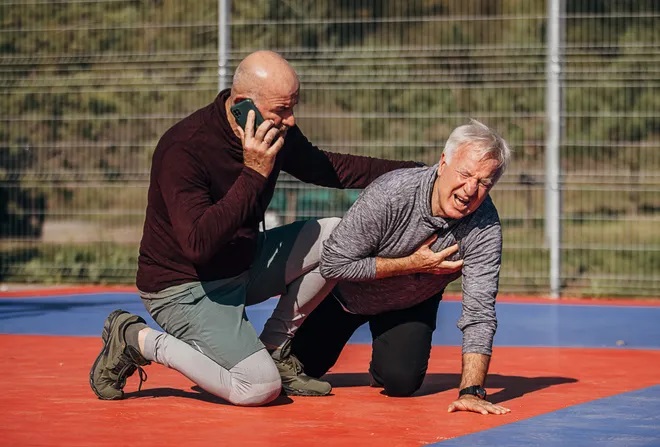
10, Oct 2023
Sudden cardiac arrest can strike anytime, anywhere, and affect anyone, regardless of age or gender.
The heart stops beating in sudden cardiac arrest. It can be fatal and therefore needs immediate medical attention.
More than 350,000 deaths occur yearly due to sudden cardiac arrest in a non-hospital environment.
Sadly, only about 10% of people survive these sudden cardiac arrest events.
It is essential to understand what sudden cardiac arrest is, the warning signs and how to quickly respond and prevent it from happening.
Sudden cardiac arrest can develop from an underlying malfunction of the heart's electrical system or a potential infection caused by physical trauma.
The most common cause of sudden cardiac arrest is a dangerous abnormal heart rhythm called ventricular fibrillation (VF). In VF, the malfunction of the electrical signals that control the ventricles (lower chambers of the heart) throws the ventricles into fibrillation, an extremely rapid and irregular chaotic rhythm that cannot effectively pump blood to the other parts of the body.
This irregular rhythm, known as ventricular fibrillation, causes loss of consciousness within seconds. When the heart stops beating, blood circulation ceases, leading to oxygen deprivation in the brain and other vital organs.
Sudden cardiac arrest can be fatal within minutes if left untreated.
Certain risk factors for sudden cardiac arrest include a prior heart attack, family history of sudden death, heart failure or massive heart attack, having an abnormal heart rate or rhythm of unknown cause, episodes of recurrent fainting of unknown cause, history of congenital heart defects, and low pumping function of the heart.
Warning signs of sudden cardiac arrest include a sudden collapse, absent pulse, no breathing and loss of consciousness.
Preceding signs and symptoms may include fatigue, fainting spells, dizziness, weakness, vomiting, chest pain, shortness of breath and palpitations.
However, a lot of times sudden cardiac arrest occurs without warning. If you recognize someone in sudden cardiac arrest, call 911 immediately.
Start performing CPR as soon as possible. If you don't know how to do CPR, conduct hands-only CPR, which involves chest compressions by pushing hard in the middle of the victim's chest at approximately 100 beats per minute.
To restore normal sinus rhythm, a responder can use a machine, also called an automated external defibrillator (AED), that delivers an electrical shock to the heart when an irregular heart rhythm is detected.
Portable AEDs are increasingly available in various public locations, such as airports, gyms, shopping malls, office buildings and casinos.
The majority of victims of sudden cardiac arrest die before they can reach a local hospital. Prompt action by bystanders alerting first responders and beginning CPR can improve the overall outcome.
October is Sudden Cardiac Arrest Awareness Month, helping people become more informed so that potentially many lives are saved by CPR and other life-saving actions.
Let's join together to raise public awareness, understanding of warning signs and action in out-of-hospital sudden cardiac arrest cases and how to increase survival rates.
Minutes matter! So why wait?
Call your healthcare provider to calculate your risks and educate your family members on the importance of early intervention in the form of CPR if cardiac arrest occurs.
Learning CPR is a great way to help protect family and friends in the case of an emergency. Get CPR certified, go out into our communities, and provide education to as many people as possible.
While there are often no preceding signs or symptoms of sudden cardiac arrest, there are things people can do to decrease the likelihood of avoiding it.
Live a healthy lifestyle by exercising regularly, avoiding tobacco and excessive alcohol, managing stress and eating a balanced diet.
Monitor and treat all underlying health conditions, including diabetes, high blood pressure and high cholesterol.
Ask a doctor about monitoring heart function to determine if there is a risk. Know your family's heart history and understand the risks for other cardiovascular-related conditions, such as heart failure.
Whether scheduling a check-up or seeking advice, prioritizing your heart health can be life-changing.
Your heart matters, and so does your awareness.
Call Dr. Sue Mitra for expert guidance on your heart health journey.
Dr. Sue Mitra and her staff strive to offer their patients the best care, advice and services available in the medical field with the goal to keep patient healthy & happy.

Dr. Sue Mitra is board certified in international medicine. She is seen here with a Cologuard, which is a noninvasive colon cancer screening test. (Photo by: Tim Shortt/Florida Today)